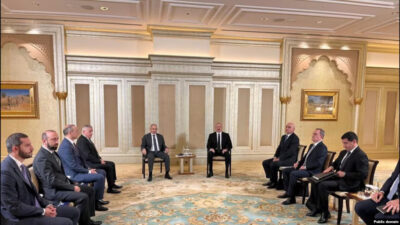By Muriel Mirak-Weissbach
Special to the Mirror-Spectator
BERLIN — The news from Rome hit Germany like a thunderbolt. As soon as the Armenian rite mass on April 12 had ended, news media flashed headlines across their websites and radio waves. The evening news programs opened with the announcement that Pope Francis had commemorated the victims of the Armenian genocide, and in those words. Pinar Atalay, the Turkish-German anchorwoman on national TV, spoke against a backdrop photo of Istanbul, a city, she said, where Armenians and Turks had lived together for centuries until the First World War. Even a century later, she said, the term “Genocide“ is taboo in Turkey. Now the Pope has broken that taboo and put his finger on a sensitive wound. After she presented the facts of his speech, a background report with historical photographic documents informed viewers how up to 1.5 million Armenians had perished through massacres, deportations and starvation.
Pope Francis had come under direct pressure from Turkey prior to his mass at St. Peter‘s. Originally the Pontiff had planned to visit Armenia on April 24, but after Turkey’s ambassador to the Holy See Mehmet Pacaci officially protested, the Pope decided to celebrate the mass on April 12 in Rome. If the Turkish diplomat thought that he had thereby safeguarded the taboo, he was sadly mistaken.
The German media, which have previously displayed caution in their choice of words, appear to have been emboldened by the Pope’s example to sport headlines like “Pope Francis launches genocide accusations against Turkey.“ Coverage stressed the “politically explosive issue“ the Pope addressed and devoted attention to attempts to explain the reasons behind the official Turkish reactions, as melodramatic as they were pathetic.
But it is not only the Turkish reaction that captured attention in Germany. As ZdF, the second national TV channel reported, the Pope’s message will impact German politics at the highest level. German President Gauck had also received an invitation to Yerevan for April 24, but instead, according to a spokeswoman, “will take part in a church service [in Berlin]in commemoration of the suffering of Armenians and other Christian minorities in the Ottoman Empire.“ To be noted: He will be the first German president to do so. What will he say on that occasion?







